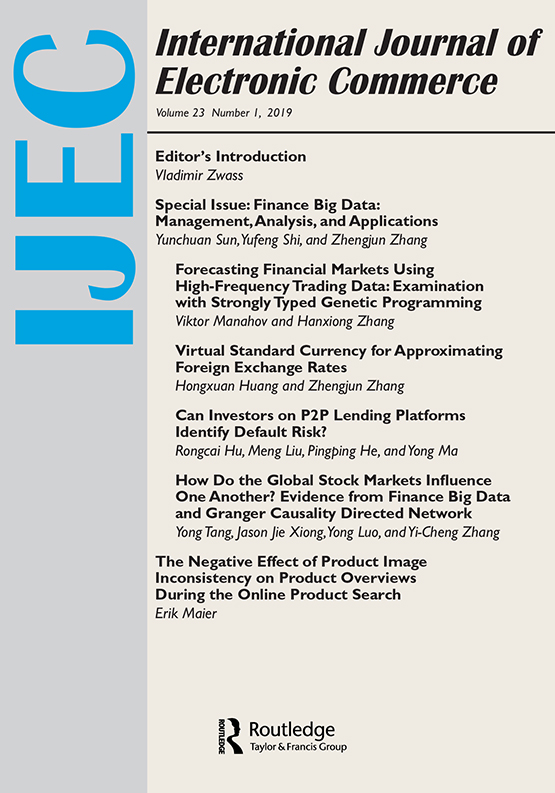通过网络品牌社区增进关系:海报和诱饵的比较
IF 3.8
3区 管理学
Q2 BUSINESS
International Journal of Electronic Commerce
Pub Date : 2023-01-02
DOI:10.1080/10864415.2022.2158596
引用次数: 3
摘要
摘要本研究确立了考虑海报(互动成员)和潜伏者(非互动成员)的重要性,以更清楚地了解在线品牌社区。基于组织支持理论和社会认同理论,本研究提出了一个模型——一个说明品牌在线社区中感知到的品牌支持对成员社区认同和品牌信任的影响的模型,导致他们对品牌的积极行为(即购买意愿、对负面信息的抵制和积极的口碑),以及这些影响在海报和潜伏者之间的差异。使用结构方程模型,结果表明,在公司托管的在线品牌社区中,感知到的品牌支持(即承认贡献、鼓励互动和提供优质信息)通过满足成员的社会情感需求(社区身份)与成员的满意度相关,并增加了他们的品牌信任。此外,多组分析表明,海报和潜伏者在获得品牌信任的途径上存在显著差异。品牌知识,提供优质信息,鼓励会员互动,为潜伏者带来品牌信任。对于海报来说,信任是由他们的社区认同感和鼓励成员互动驱动的。这项研究通过揭示网络社区中潜伏者的不足知识,推进了关于网络品牌社区的文献。它展示了品牌的感知支持如何改善海报和潜伏者与社区和品牌本身的关系。研究结果为品牌如何管理与在线社区中所有成员(包括海报和潜伏者)的关系提供了可行的管理建议。本文章由计算机程序翻译,如有差异,请以英文原文为准。
Enhancing Relationships Through Online Brand Communities: Comparing Posters and Lurkers
ABSTRACT This study establishes the importance of considering both posters (interactive members) and lurkers (non-interactive members) for a clearer understanding of online brand communities. Based on organizational support theory and social identity theory, this study proposes a model a model that illustrates the impacts of perceived brand support in brands’ online communities upon members’ community identity and brand trust, leading to their positive behaviors toward the brand (i.e., purchase intention, resistance to negative information, and positive word of mouth) and how these effects differ between posters and lurkers. Using structural equation modeling, results reveal that in firm-hosted online brand communities, perceived brand support (i.e., recognizing contributions, encouraging interactions, and providing quality information) relates to members’ satisfaction by fulfilling their socioemotional needs (community identity) and increases their brand trust. Furthermore, multigroup analyses indicate significant differences in the paths to brand trust between posters and lurkers. Brand knowledge, providing quality information, and encouraging members to interact drive brand trust for lurkers. For posters, trust is driven by their sense of community identity and encouraging members to interact. This research advances the literature on online brand communities by shedding light on the scant knowledge of lurkers in online communities. It demonstrates how perceived support from brands can improve both posters’ and lurkers’ relationships with the community and the brand itself. The findings provide actionable managerial recommendations regarding how brands can manage their relationships with all members (both posters and lurkers) in their online communities.
求助全文
通过发布文献求助,成功后即可免费获取论文全文。
去求助
来源期刊

International Journal of Electronic Commerce
工程技术-计算机:软件工程
CiteScore
7.20
自引率
16.00%
发文量
18
审稿时长
>12 weeks
期刊介绍:
The International Journal of Electronic Commerce is the leading refereed quarterly devoted to advancing the understanding and practice of electronic commerce. It serves the needs of researchers as well as practitioners and executives involved in electronic commerce. The Journal aims to offer an integrated view of the field by presenting approaches of multiple disciplines.
Electronic commerce is the sharing of business information, maintaining business relationships, and conducting business transactions by digital means over telecommunications networks. The Journal accepts empirical and interpretive submissions that make a significant novel contribution to this field.
 求助内容:
求助内容: 应助结果提醒方式:
应助结果提醒方式:


